Trump's White nationalist agenda, Democratic Party failures decried by panelists
By Barrington M. Salmon -Contributing Writer- | Last updated: Feb 6, 2018 - 12:52:34 PM
AddThis Sharing Buttons
Share to FacebookFacebookShare to TwitterTwitterShare to MoreMore
What's your opinion on this article?
The Real State of the Union and America’s political reality
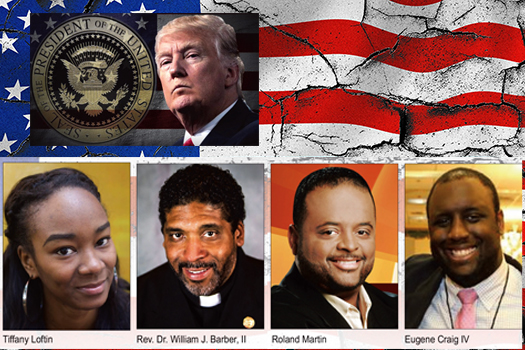
WASHINGTON—Close to the conclusion of a sometimes intense duo of panel discussions, the Rev. Dr. William J. Barber, II walked deliberately up to a lectern in the front of the sacristy of Shiloh Baptist Church.
In a powerful 20-plus minute presentation, Rev. Barber tied up the disparate threads of a wide-ranging dialogue that examined and fleshed out the dangers to Blacks in America of the rightward tilt of judicial nominations and appointments; how best to pursue collective interests rather being tied to any political party; ways to attain economic self-sufficiency; voter mobilization; organizing; and refining political and election strategy.
Panelists also condemned the administration’s hostility towards Blacks, immigrants, the LGBTQ community and championing White, heterosexual “Christian” males.
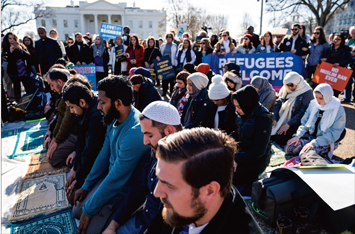
Supporters surround a group who perform the Islamic midday prayer outside the White House in Washington, Jan. 27, during a rally on the one-year anniversary of the Trump Administration’s first partial travel ban on citizens from seven Muslim majority countries. Photo: AP/Wide World Photos
While castigating the Trump administration, Rev. Barber said that what America is witnessing is merely a modern incarnation and the end-product of more than 100 years of attempts by White extremists to blunt any progress made by Blacks, women and progressives in this country.
President Trump, Rev. Barber asserted isn’t the problem. He is merely a symptom of America’s moral sickness, and the activist reverend told an audience of several hundred people, America is in the midst of a Third Reconstruction.
“We’re witnessing a fundamental changing of our demographics around the world,” said Rev. Barber, former president of the North Carolina NAACP and president and senior lecturer of Repairers of the Breach. “We see extremist policies in America today and it’s driven by the growing blackening and browning of America and a fusion of every creed, color and class.”
“Those who embrace the Make America Great Again slogan are willing to work hard and cheat to undermine what is evolving in America,” said Rev. Barber, a prominent national activist and an unapologetic voice of resistance to this administration’s hard move to the right. “This is White hegemony and White nationalism strengthened by enormous wealth.”
Rev. Barber’s analysis of Mr. Trump’s calculated and cynical attacks on non-Whites, his deconstruction of America’s racial malady and his exhortation for Blacks, progressives and other allies to join the movement against extremism, wrapped up a more than two-hour panel discussion involving leading political and civil rights activists, organizers, educators, and thinkers in the Black and Latino communities.
The event, “The Real State of Our Union,” was one of dozens of progressive and anti-Trump alternatives around the country to counter the president’s first State of the Union address Jan. 30, before a joint session of Congress.
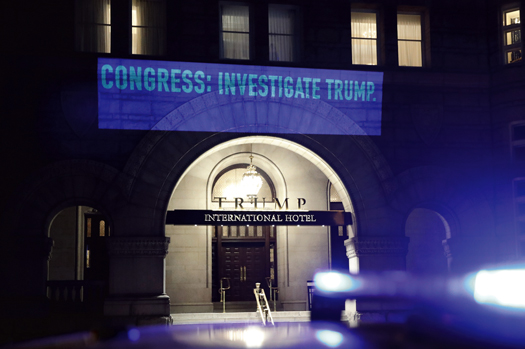
The alternative State of the Union, arranged and moderated by former News One anchor and news personality Roland Martin, was co-sponsored by the National Association for the Advancement of Colored People.
“There’s no network tonight where you’ll see this many Black people discussing issues of concern to our communities,” Mr. Martin told the audience. “This will be a feature broadcast of Facebook, YouTube and Twitter.”
One of the constant reminders expressed by Mr. Martin and several panelists is that elections have consequences, including the election of a man critics charge with being politically inept, unfit, morally bankrupt, erratic, temperamentally unfit and lacking the qualities of character necessary to be Commander-in-Chief.
“You can’t ignore the top of the ticket,” Mr. Martin said. “One of those two people will win and have an impact on your life. You need to think how this could change people’s lives. No matter how you feel, you gotta stay in the game.”
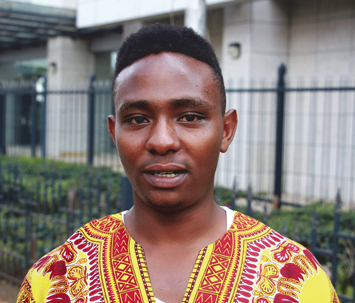
Kenya university student Stanley Musyemi speaks during an interview in Nairobi, Kenya, Jan. 12.
Africans woke up to find President Donald Trump had finally taken an interest in their continent. It wasn’t what people had hoped for. Using vulgar language, Trump on Jan. 11, questioned why the U.S. would accept more immigrants from Haiti and “shithole countries” in Africa rather than places like Norway in rejecting a bipartisan immigration deal. Musyemi said that Trump’s words were “very unfair” and “an act of racism”.
Eugene Craig, IV, the former vice chairman of the Maryland Republican Party said both parties have to give voters, especially young voters, something to vote for.
“The issue is having a reason to vote,” he said. “We had the pleasure of eight years of Barack Obama, for us, fear isn’t traditional motivation to vote.”
Labor and human rights organizer Tiffany Loftin hammered home her distrust of both parties, one increasingly shared by Africans in America.
She shared with the audience the internal divisions in the Democratic Party and the struggle of progressives to have a voice during the run-up to the 2016 elections. The Hillary Clinton forces played hardball to ensure that there were no road bumps to the nomination and in the process angered and alienated supporters of Bernie Sanders. Ms. Loftin talked about the betrayal and backstabbing.
“Folks felt they screwed us over by the pushing out of Bernie Sanders,” she said. “Even now, people (in the party) are not supporting the ideas of progressiveness. But we’re seeing young people run for office and form caucuses. We keep fighting … and we want a collective space for new millennials and historical knowledge.”
“We have congressmen in office 50, 60 years. Why? If I had served that long, I’d be retired, in a bikini on the beach, sipping daiquiris. At a certain point, we have to pass the baton.”
“I have not been, never will be a fan of Democrats and I’m never going to join the Republican Party,” she said to audience laughter. “I’m ready for us to stop judging and fighting political names and start our own thing. We need our own party.”
Dayvon Love, director of Research and Public Policy at Leaders of a Beautiful Struggle, echoed Ms. Loftin, while focused on the importance of developing opportunities and a pipeline into politics for Blacks and holding Democrats’ feet to the fire.
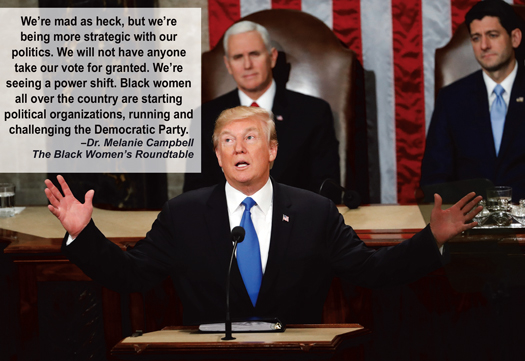
President Donald Trump delivers his State of the Union address to a joint session of Congress on Capitol Hill in Washington, Jan. 30. Photo: AP/Wide World Photos
“We’ve had an exploitative relationship with Democrats,” he said. “We need political infrastructures. If the political infrastructure is outside of your community, you’re beholden to people outside. If we don’t own it and support it, it’s not ours. When we own our institutions, Black people can benefit. It’s also important to monetize our institutions.”
Ms. Loftin was particularly critical of older politicos and activists for ignoring those of her generation.
“Young voices, Millennials have all the answers but folks aren’t listening,” she asserted. “We need to educate, share and create new knowledge together. We can build institutions and take over the world.”
In his 80-minute address to Congress, Mr. Trump called this time, “a new American moment,” claiming that “a new tide of optimism was already sweeping across our land.” Of course, Trump being Trump, he spent much of the time boasting about the incredible progress and extraordinary success his administration has achieved in its first year.
“His words, actions and appointments and all we’ve seen, is a policy of division,” said Kristen Clarke, president and executive director of the Lawyers’ Committee for Civil Rights Under the Law. “He has taken us back decades. We’ve seen a spike in hate crimes, Charlottesville, and his inability to condemn Neo-Nazis … it’s hard not to trace ugly hate and animus to this White House.”
Ms. Clarke, Dr. Melanie Campbell of the Black Women’s Roundtable, NAACP president and other panelists warned about the danger posed to Blacks, other people of color, the poor and the most vulnerable by Mr. Trump’s judicial appointments. In his first year, he, Senate Majority Leader Mitch McConnell and Republican leadership have rammed through nominations to federal, district and circuit court after eight years of holding up or blocking former President Obama’s nominees.
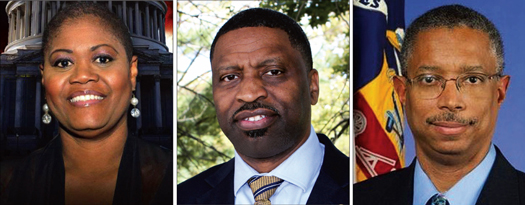
(L-R) Dr. Melanie Campbell, NAACP president Derrick Johnson, Dr. William E. Spriggs
“This is a huge issue,” Ms. Clarke explained. There are 140 vacancies in federal courts. The judiciary has always mattered to Black people because it is a place of last resort in seeking protection or justice. Ninety-nine percent of cases are heard in federal and district courts. Ninety-one percent of those Mr. Trump is putting forward are White and male and they are the fringe. He’s turning back the clock to the Jim Crow era.”
Dr. William E. Spriggs, chief economist for the American Federation of Labor and Congress of Industrial Organizations, the largest federation of unions in the U.S., belied Mr. Trump’s claims of jumpstarting the economy after years of stagnation under his predecessor, Barack Obama.
“The good news is that the economy started to expand in 2010,” said Dr. Spriggs, who served as assistant secretary for policy at the U.S. Department of Labor under President Obama. “When he took office, he (Mr. Trump) inherited the lowest unemployment rate of any president. He got on a train that was already moving. Now that person is claiming credit. That’s like a rooster claiming that the sun rose because he crowed.”
Dr. Spriggs, a professor in, and former chair of, the Department of Economics at Howard University, said President Obama oversaw the longest string of growth in successive months in history. But the bad news is that the U.S. saw the slowest job growth since 2010, although the employee-to-population ratio accelerated in 2011. “While the labor participation rates for Blacks and Latinos is going up, union density is going down and Black unemployment rate is double the national rate,” he said.
Black business owners, particularly Black women, face some serious headwinds because of structural inequities and an economy that doesn’t recognize Black women, he said.
NAACP President Derrick Johnson set the table for the next generation with his insistence that Black people use their vote wisely. If 28,000 Black voters had not skipped choosing one of the candidates at the top of the ballot, Mr. Trump would not have won the election, he asserted.
Dr. Greg Carr, chair of Howard University’s History Department, offered caustic comments about Trump and the environment he and his administration have fostered. He said:
“They’re extremists, there’s no such thing as the United States of America and Mike Pence is a Christian fundamentalist … Mitch McConnell and Paul Ryan are wholly-owned subsidiaries of corporations and the Koch Brothers. Steven Miller has proposed cutting immigration. These people don’t give a damn. We’re appealing to a morality these people have never had.”
Meanwhile, the NAACP’s Johnson and Dr. Melanie Campbell spoke of the importance of Black people flexing their electoral muscle in the upcoming midterms and the 2020 general elections.
Mr. Johnson, who was elected president and CEO of the venerable Civil Rights organization in 2017, said, “There are 88 legislative bodies up for election and we have to vote in all these races. Redistricting and the midterms are on the horizon. Folks, we have to lean into our collective consciousness and turn out to vote. Nothing else matters.”
“We’re mad as heck, but we’re being more strategic with our politics,” added Ms. Campbell. “We will not have anyone take our vote for granted. We’re seeing a power shift. Black women all over the country are starting political organizations, running and challenging the Democratic Party. More and more Black people don’t think the Democratic Party represents their interests.”
Rev. Barber read some verses from Ezekiel, chapter 22.
The quote expressed God’s angry because priests were violating His law and desecrating His holy things. Politicians are like wolves, prowling and killing and the preachers are pretending, covering up politicians’ immoral and egregious behavior.
“Extortion is ripe, robberies epidemic, immigrants, strangers are kicked around at will,” said Rev. Barber. “It’s movement time. Every political leader must be judged. The tree is known, the president and Congress are known by the fruit it bears.”
Between 1865-1887, a coalition of Black and White activists rewrote state constitutions in the South, sent Black senators and congressmen to Washington, pushed for passage of the 13th, 14th and 15th Amendments, guaranteed a living wage and passed a measure outlawing segregation. But White extremists could not allow this to continue so they formed the Ku Klux Klan to punish White progressives working with Blacks, initially.
“Then in 1877, Rutherford Hayes lost the popular vote but was installed with the promise that he would remove federal troops and reverse the gains made by the fusion of Blacks and Whites … something has happened to the political ethos of this country. We have another president who lost by three million votes. We have someone who lost but the Southern Strategy won,” said Rev. Barber.
Rev. Barber called cast-off Americans—criminalized children, the working poor, those whose medical care has been snatched by greedy politicians, and maligned immigrants—dry bones which will become the army of morality and justice to confront and defeat dishonest and immoral politicians.
Eugene Craig, IV, the former vice chairman of the Maryland Republican Party said both parties have to give voters, especially young voters, something to vote for.
“The issue is having a reason to vote,” he said. “We had the pleasure of eight years of Barack Obama, for us, fear isn’t traditional motivation to vote.”
Labor and human rights organizer Tiffany Loftin hammered home her distrust of both parties, one increasingly shared by Africans in America.
She shared with the audience the internal divisions in the Democratic Party and the struggle of progressives to have a voice during the run-up to the 2016 elections. The Hillary Clinton forces played hardball to ensure that there were no road bumps to the nomination and in the process angered and alienated supporters of Bernie Sanders. Ms. Loftin talked about the betrayal and backstabbing.
“Folks felt they screwed us over by the pushing out of Bernie Sanders,” she said. “Even now, people (in the party) are not supporting the ideas of progressiveness. But we’re seeing young people run for office and form caucuses. We keep fighting … and we want a collective space for new millennials and historical knowledge.”
“We have congressmen in office 50, 60 years. Why? If I had served that long, I’d be retired, in a bikini on the beach, sipping daiquiris. At a certain point, we have to pass the baton.”
“I have not been, never will be a fan of Democrats and I’m never going to join the Republican Party,” she said to audience laughter. “I’m ready for us to stop judging and fighting political names and start our own thing. We need our own party.”
Dayvon Love, director of Research and Public Policy at Leaders of a Beautiful Struggle, echoed Ms. Loftin, while focused on the importance of developing opportunities and a pipeline into politics for Blacks and holding Democrats’ feet to the fire.

President Donald Trump delivers his State of the Union address to a joint session of Congress on Capitol Hill in Washington, Jan. 30. Photo: AP/Wide World Photos
“We’ve had an exploitative relationship with Democrats,” he said. “We need political infrastructures. If the political infrastructure is outside of your community, you’re beholden to people outside. If we don’t own it and support it, it’s not ours. When we own our institutions, Black people can benefit. It’s also important to monetize our institutions.”
Ms. Loftin was particularly critical of older politicos and activists for ignoring those of her generation.
“Young voices, Millennials have all the answers but folks aren’t listening,” she asserted. “We need to educate, share and create new knowledge together. We can build institutions and take over the world.”
In his 80-minute address to Congress, Mr. Trump called this time, “a new American moment,” claiming that “a new tide of optimism was already sweeping across our land.” Of course, Trump being Trump, he spent much of the time boasting about the incredible progress and extraordinary success his administration has achieved in its first year.
“His words, actions and appointments and all we’ve seen, is a policy of division,” said Kristen Clarke, president and executive director of the Lawyers’ Committee for Civil Rights Under the Law. “He has taken us back decades. We’ve seen a spike in hate crimes, Charlottesville, and his inability to condemn Neo-Nazis … it’s hard not to trace ugly hate and animus to this White House.”
Ms. Clarke, Dr. Melanie Campbell of the Black Women’s Roundtable, NAACP president and other panelists warned about the danger posed to Blacks, other people of color, the poor and the most vulnerable by Mr. Trump’s judicial appointments. In his first year, he, Senate Majority Leader Mitch McConnell and Republican leadership have rammed through nominations to federal, district and circuit court after eight years of holding up or blocking former President Obama’s nominees.

(L-R) Dr. Melanie Campbell, NAACP president Derrick Johnson, Dr. William E. Spriggs
“This is a huge issue,” Ms. Clarke explained. There are 140 vacancies in federal courts. The judiciary has always mattered to Black people because it is a place of last resort in seeking protection or justice. Ninety-nine percent of cases are heard in federal and district courts. Ninety-one percent of those Mr. Trump is putting forward are White and male and they are the fringe. He’s turning back the clock to the Jim Crow era.”
Dr. William E. Spriggs, chief economist for the American Federation of Labor and Congress of Industrial Organizations, the largest federation of unions in the U.S., belied Mr. Trump’s claims of jumpstarting the economy after years of stagnation under his predecessor, Barack Obama.
“The good news is that the economy started to expand in 2010,” said Dr. Spriggs, who served as assistant secretary for policy at the U.S. Department of Labor under President Obama. “When he took office, he (Mr. Trump) inherited the lowest unemployment rate of any president. He got on a train that was already moving. Now that person is claiming credit. That’s like a rooster claiming that the sun rose because he crowed.”
Dr. Spriggs, a professor in, and former chair of, the Department of Economics at Howard University, said President Obama oversaw the longest string of growth in successive months in history. But the bad news is that the U.S. saw the slowest job growth since 2010, although the employee-to-population ratio accelerated in 2011. “While the labor participation rates for Blacks and Latinos is going up, union density is going down and Black unemployment rate is double the national rate,” he said.
Black business owners, particularly Black women, face some serious headwinds because of structural inequities and an economy that doesn’t recognize Black women, he said.
NAACP President Derrick Johnson set the table for the next generation with his insistence that Black people use their vote wisely. If 28,000 Black voters had not skipped choosing one of the candidates at the top of the ballot, Mr. Trump would not have won the election, he asserted.
Dr. Greg Carr, chair of Howard University’s History Department, offered caustic comments about Trump and the environment he and his administration have fostered. He said:
“They’re extremists, there’s no such thing as the United States of America and Mike Pence is a Christian fundamentalist … Mitch McConnell and Paul Ryan are wholly-owned subsidiaries of corporations and the Koch Brothers. Steven Miller has proposed cutting immigration. These people don’t give a damn. We’re appealing to a morality these people have never had.”
Meanwhile, the NAACP’s Johnson and Dr. Melanie Campbell spoke of the importance of Black people flexing their electoral muscle in the upcoming midterms and the 2020 general elections.
Mr. Johnson, who was elected president and CEO of the venerable Civil Rights organization in 2017, said, “There are 88 legislative bodies up for election and we have to vote in all these races. Redistricting and the midterms are on the horizon. Folks, we have to lean into our collective consciousness and turn out to vote. Nothing else matters.”
“We’re mad as heck, but we’re being more strategic with our politics,” added Ms. Campbell. “We will not have anyone take our vote for granted. We’re seeing a power shift. Black women all over the country are starting political organizations, running and challenging the Democratic Party. More and more Black people don’t think the Democratic Party represents their interests.”
Rev. Barber read some verses from Ezekiel, chapter 22.
The quote expressed God’s angry because priests were violating His law and desecrating His holy things. Politicians are like wolves, prowling and killing and the preachers are pretending, covering up politicians’ immoral and egregious behavior.
“Extortion is ripe, robberies epidemic, immigrants, strangers are kicked around at will,” said Rev. Barber. “It’s movement time. Every political leader must be judged. The tree is known, the president and Congress are known by the fruit it bears.”
Between 1865-1887, a coalition of Black and White activists rewrote state constitutions in the South, sent Black senators and congressmen to Washington, pushed for passage of the 13th, 14th and 15th Amendments, guaranteed a living wage and passed a measure outlawing segregation. But White extremists could not allow this to continue so they formed the Ku Klux Klan to punish White progressives working with Blacks, initially.
“Then in 1877, Rutherford Hayes lost the popular vote but was installed with the promise that he would remove federal troops and reverse the gains made by the fusion of Blacks and Whites … something has happened to the political ethos of this country. We have another president who lost by three million votes. We have someone who lost but the Southern Strategy won,” said Rev. Barber.
Rev. Barber called cast-off Americans—criminalized children, the working poor, those whose medical care has been snatched by greedy politicians, and maligned immigrants—dry bones which will become the army of morality and justice to confront and defeat dishonest and immoral politicians.